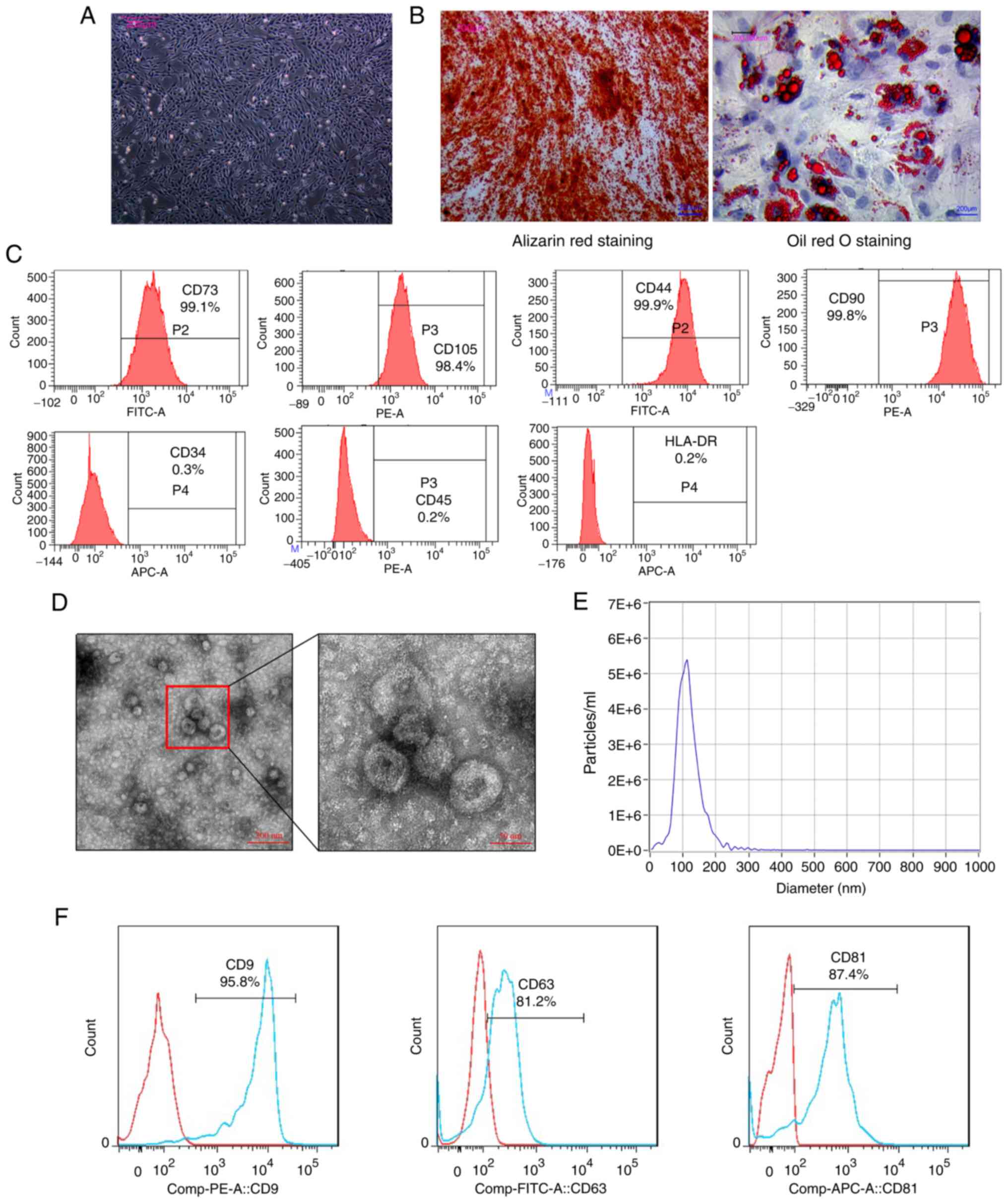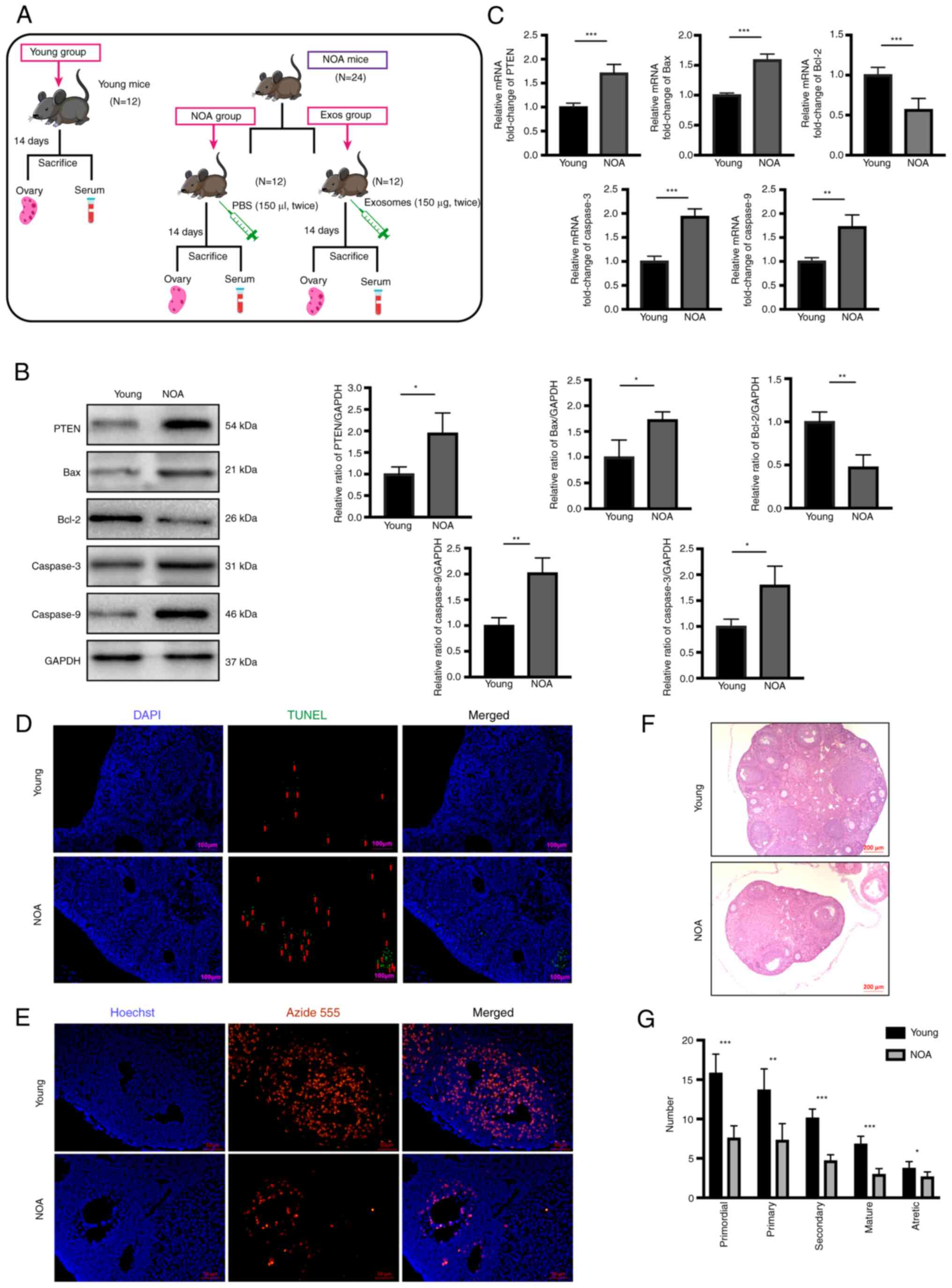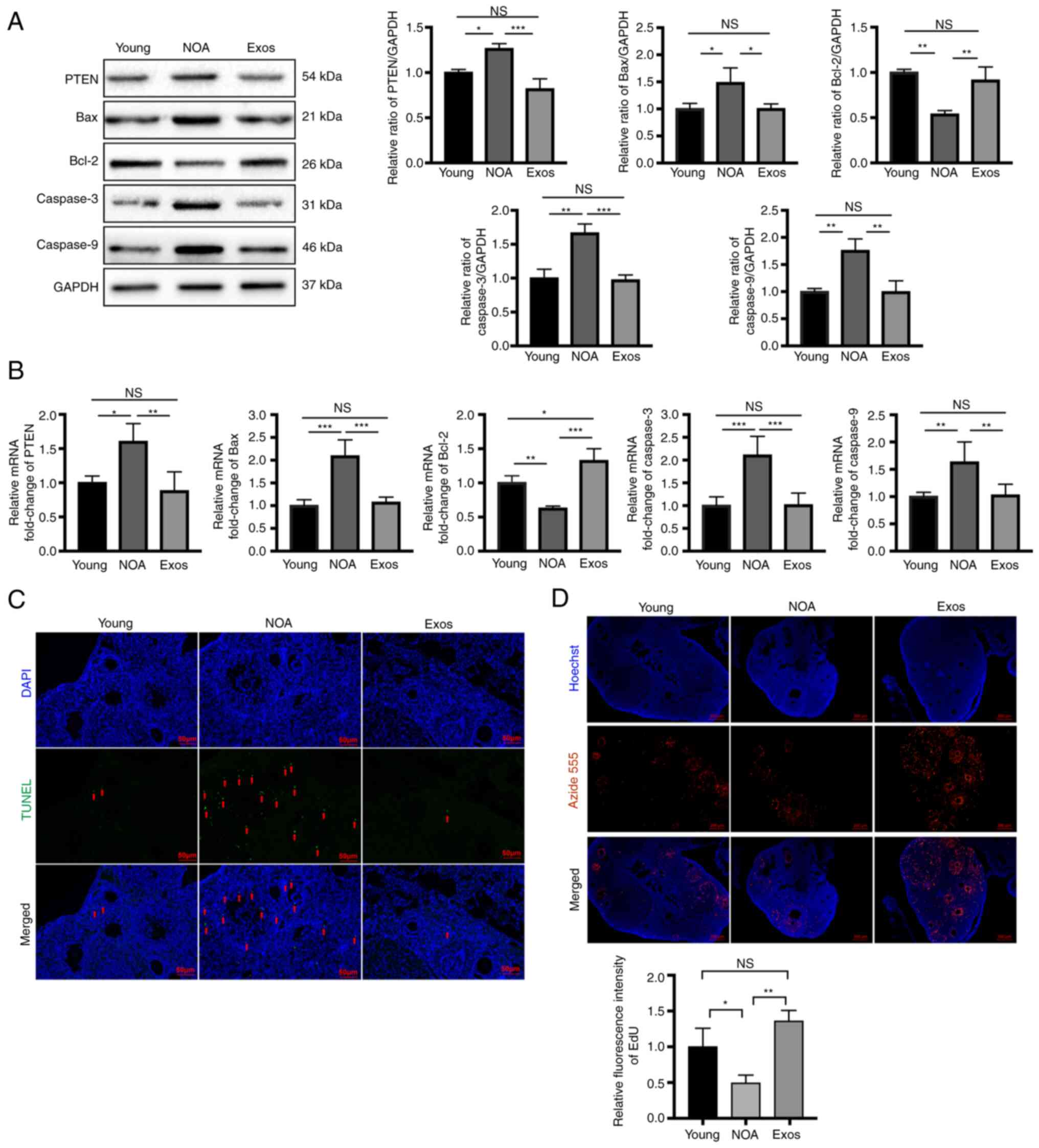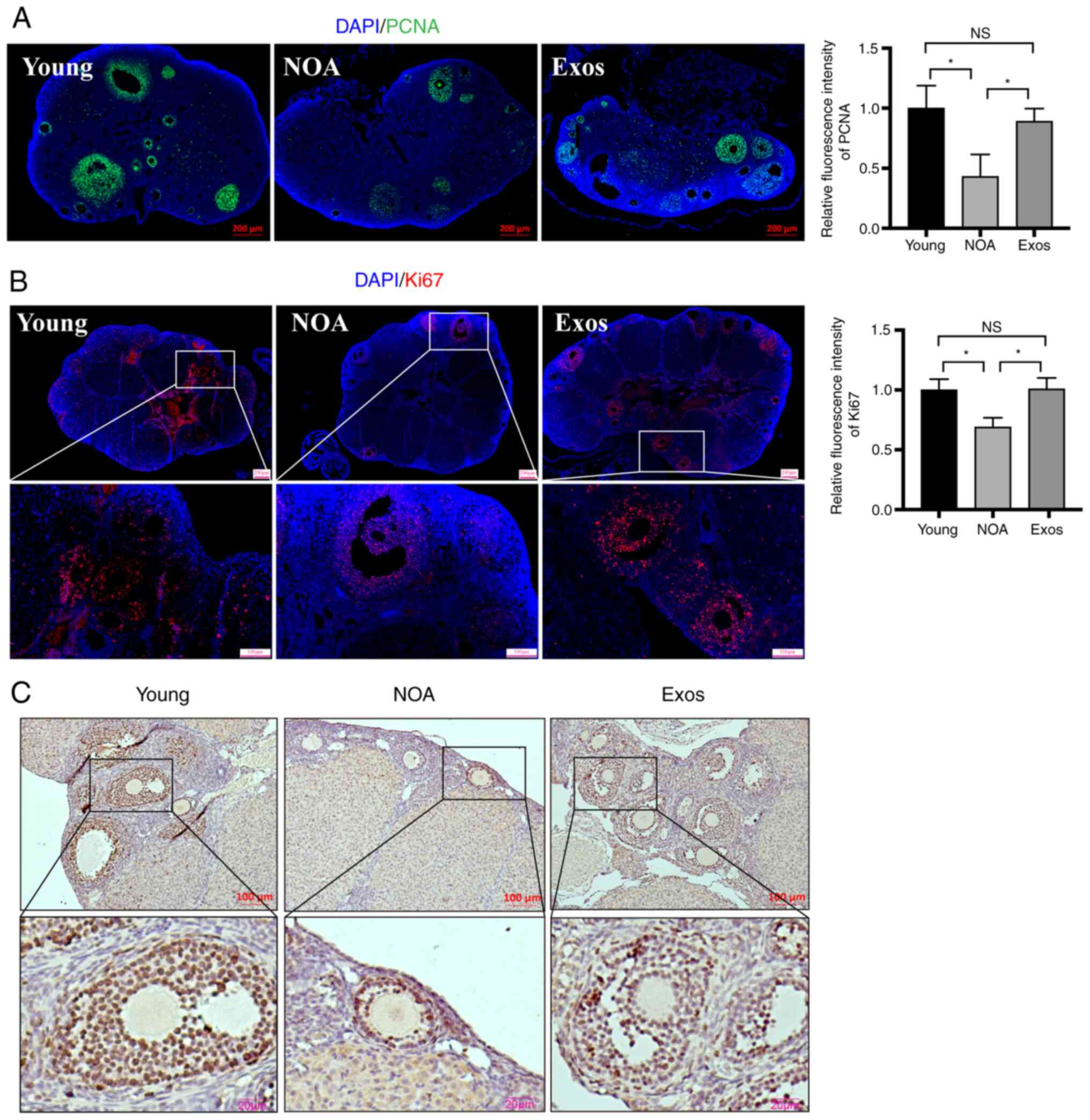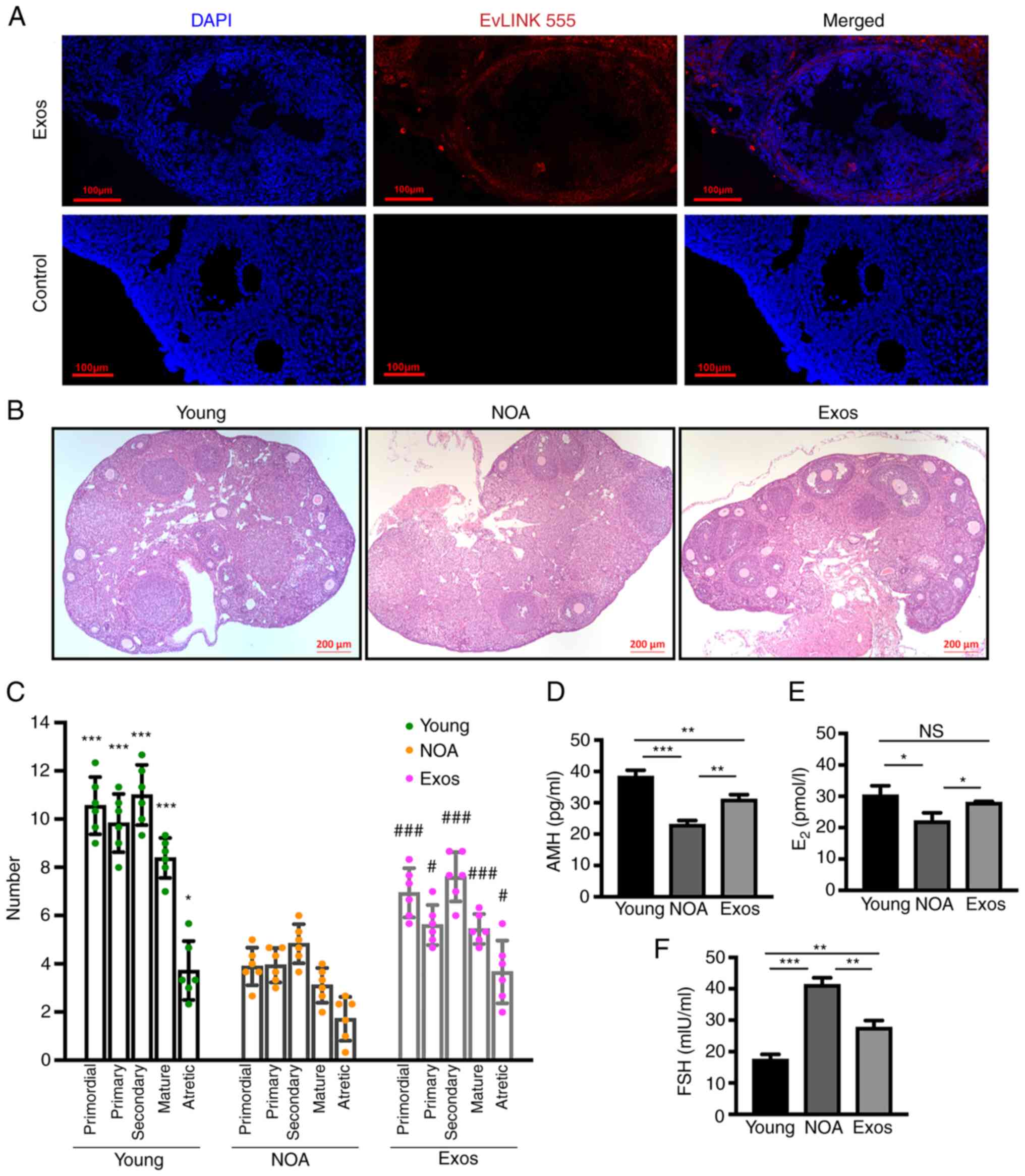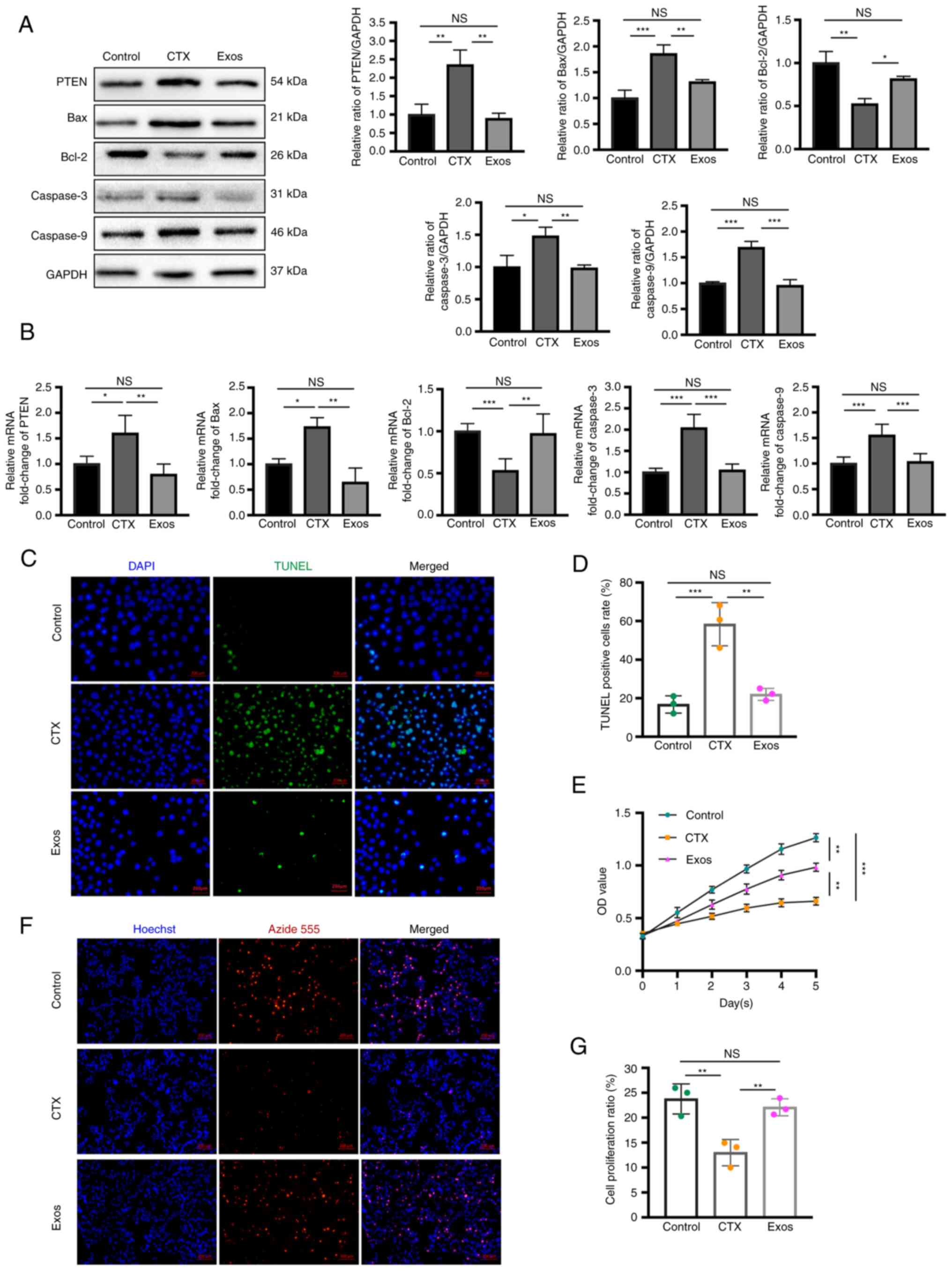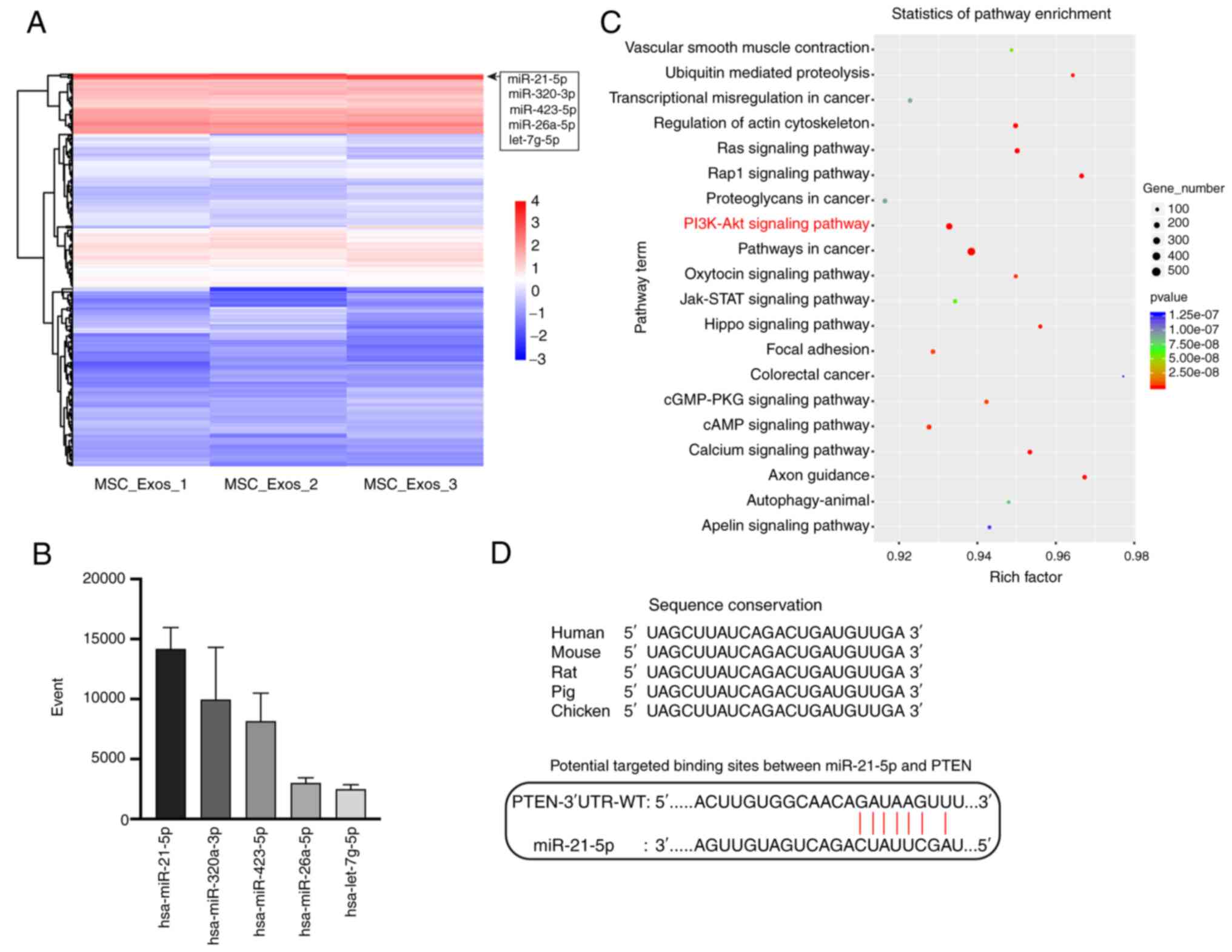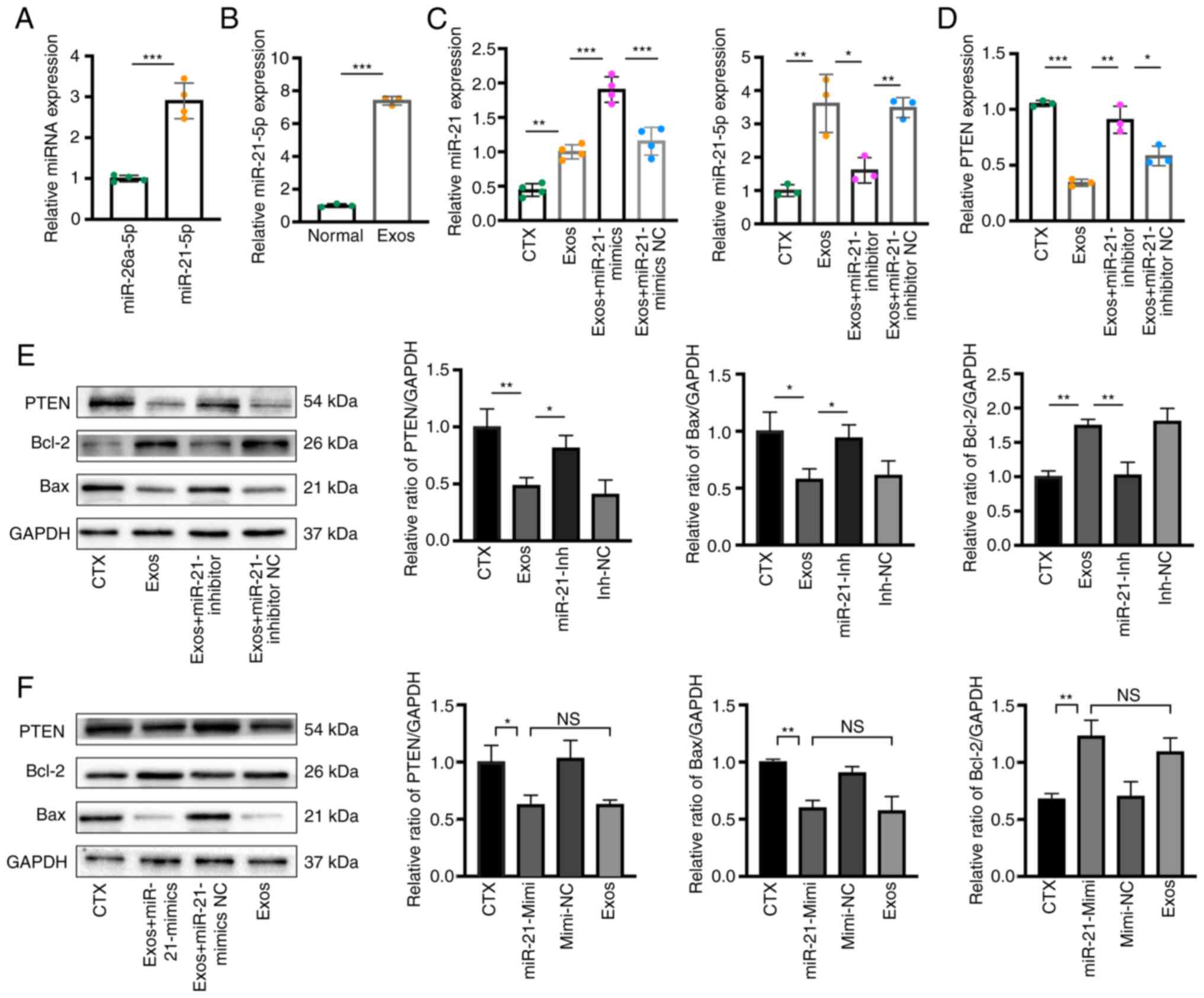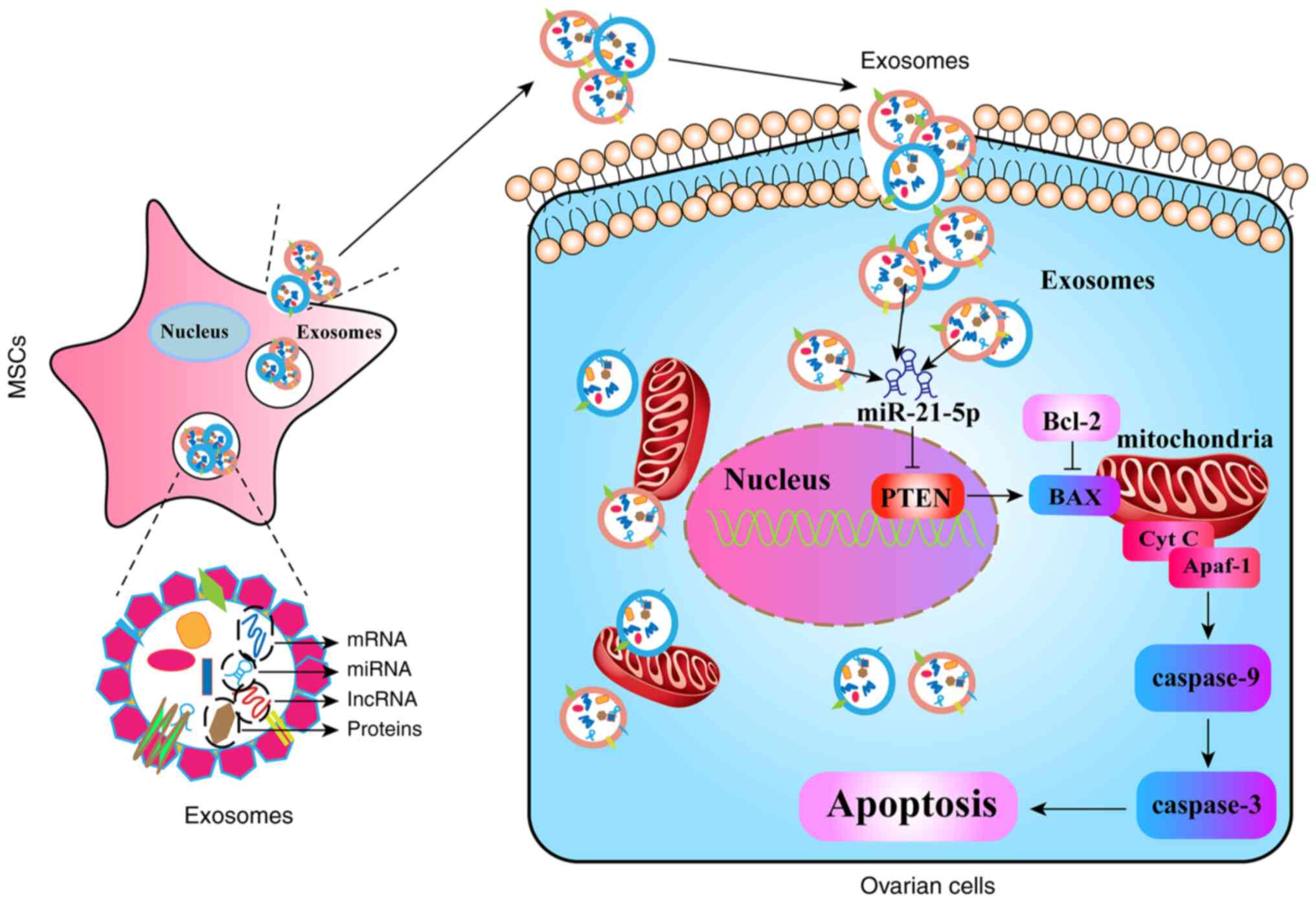|
1
|
Edson MA, Nagaraja AK and Matzuk MM: The
mammalian ovary from genesis to revelation. Endocr Rev. 30:624–712.
2009. View Article : Google Scholar : PubMed/NCBI
|
|
2
|
Nelson SM, Telfer EE and Anderson RA: The
ageing ovary and uterus: New biological insights. Hum Reprod
Update. 19:67–83. 2013. View Article : Google Scholar
|
|
3
|
Broekmans FJ, Soules MR and Fauser BC:
Ovarian aging: Mechanisms and clinical consequences. Endocr Rev.
30:465–493. 2009. View Article : Google Scholar : PubMed/NCBI
|
|
4
|
Park SU, Walsh L and Berkowitz KM:
Mechanisms of ovarian aging. Reproduction. 162:R19–R33. 2021.
View Article : Google Scholar : PubMed/NCBI
|
|
5
|
Lew R: Natural history of ovarian function
including assessment of ovarian reserve and premature ovarian
failure. Best Pract Res Clin Obstet Gynaecol. 55:2–13. 2019.
View Article : Google Scholar
|
|
6
|
Chon SJ, Umair Z and Yoon MS: Premature
ovarian insufficiency: Past, present, and future. Front Cell Dev
Biol. 9:6728902021. View Article : Google Scholar : PubMed/NCBI
|
|
7
|
Seli E: Ovarian aging. Semin Reprod Med.
33:375–376. 2015. View Article : Google Scholar : PubMed/NCBI
|
|
8
|
Check Hayden E: Anti-ageing pill pushed as
bona fide drug. Nature. 522:265–266. 2015. View Article : Google Scholar : PubMed/NCBI
|
|
9
|
Sullivan SD, Sarrel PM and Nelson LM:
Hormone replacement therapy in young women with primary ovarian
insufficiency and early menopause. Fertility Sterility.
106:1588–1599. 2016. View Article : Google Scholar : PubMed/NCBI
|
|
10
|
Ding C, Zhu L, Shen H, Lu J, Zou Q, Huang
C, Li H and Huang B: Exosomal miRNA-17-5p derived from human
umbilical cord mesenchymal stem cells improves ovarian function in
premature ovarian insufficiency by regulating SIRT7. Stem Cells.
38:1137–1148. 2020. View Article : Google Scholar : PubMed/NCBI
|
|
11
|
Pittenger MF, Mackay AM, Beck SC, Jaiswal
RK, Douglas R, Mosca JD, Moorman MA, Simonetti DW, Craig S and
Marshak DR: Multilineage potential of adult human mesenchymal stem
cells. Science. 284:143–147. 1999. View Article : Google Scholar : PubMed/NCBI
|
|
12
|
Yin N, Wu C, Qiu J, Zhang Y, Bo L, Xu Y,
Shi M, Zhu S, Yang G and Mao C: Protective properties of heme
oxygenase-1 expressed in umbilical cord mesenchymal stem cells help
restore the ovarian function of premature ovarian failure mice
through activating the JNK/Bcl-2 signal pathway-regulated autophagy
and upregulating the circulating of CD8+CD28−
T cells. Stem Cell Res Ther. 11:492020. View Article : Google Scholar
|
|
13
|
Martinez-Carrasco R, Sanchez-Abarca LI,
Nieto-Gomez C, Martin Garcia E, Sanchez-Guijo F, Argueso P, Aijón
J, Hernández-Galilea E and Velasco A: Subconjunctival injection of
mesenchymal stromal cells protects the cornea in an experimental
model of GVHD. Ocul Surf. 17:285–294. 2019. View Article : Google Scholar : PubMed/NCBI
|
|
14
|
Oliva J: Therapeutic properties of
mesenchymal stem cell on organ ischemia-reperfusion injury. Int J
Mol Sci. 20:55112019. View Article : Google Scholar : PubMed/NCBI
|
|
15
|
Salado-Manzano C, Perpina U, Straccia M,
Molina-Ruiz FJ, Cozzi E, Rosser AE and Canals JM: Is the
immunological response a bottleneck for cell therapy in
neurodegenerative diseases? Front Cell Neurosci. 14:2502020.
View Article : Google Scholar : PubMed/NCBI
|
|
16
|
Sajeesh S, Broekelman T, Mecham RP and
Ramamurthi A: Stem cell derived extracellular vesicles for vascular
elastic matrix regenerative repair. Acta Biomater. 113:267–278.
2020. View Article : Google Scholar : PubMed/NCBI
|
|
17
|
Ranganath SH, Levy O, Inamdar MS and Karp
JM: Harnessing the mesenchymal stem cell secretome for the
treatment of cardiovascular disease. Cell Stem Cell. 10:244–258.
2012. View Article : Google Scholar : PubMed/NCBI
|
|
18
|
Valadi H, Ekstrom K, Bossios A, Sjostrand
M, Lee JJ and Lotvall JO: Exosome-mediated transfer of mRNAs and
microRNAs is a novel mechanism of genetic exchange between cells.
Nat Cell Biol. 9:654–659. 2007. View Article : Google Scholar : PubMed/NCBI
|
|
19
|
Kalluri R and LeBleu VS: The biology,
function, and biomedical applications of exosomes. Science.
367L:eaau69772020. View Article : Google Scholar
|
|
20
|
Yao J, Ma Y, Zhou S, Bao T, Mi Y, Zeng W,
Li J and Zhang C: Metformin prevents follicular atresia in aging
laying chickens through activation of PI3K/AKT and calcium
signaling pathways. Oxid Med Cell Longev. 2020:36480402020.
View Article : Google Scholar : PubMed/NCBI
|
|
21
|
Tilly JL, Kowalski KI, Johnson AL and
Hsueh AJ: Involvement of apoptosis in ovarian follicular atresia
and postovulatory regression. Endocrinology. 129:2799–2801. 1991.
View Article : Google Scholar : PubMed/NCBI
|
|
22
|
Shen M, Lin F, Zhang J, Tang Y, Chen WK
and Liu H: Involvement of the up-regulated FoxO1 expression in
follicular granulosa cell apoptosis induced by oxidative stress. J
Biol Chem. 287:25727–25740. 2012. View Article : Google Scholar : PubMed/NCBI
|
|
23
|
Matsuda F, Inoue N, Manabe N and Ohkura S:
Follicular growth and atresia in mammalian ovaries: Regulation by
survival and death of granulosa cells. J Reprod Dev. 58:44–50.
2012. View Article : Google Scholar : PubMed/NCBI
|
|
24
|
Yamada KM and Araki M: Tumor suppressor
PTEN: Modulator of cell signaling, growth, migration and apoptosis.
J Cell Sci. 114:2375–2382. 2001. View Article : Google Scholar : PubMed/NCBI
|
|
25
|
Stambolic V, Suzuki A, de la Pompa JL,
Brothers GM, Mirtsos C, Sasaki T, Ruland J, Penninger JM,
Siderovski DP and Mak TW: Negative regulation of PKB/Akt-dependent
cell survival by the tumor suppressor PTEN. Cell. 95:29–39. 1998.
View Article : Google Scholar : PubMed/NCBI
|
|
26
|
Maidarti M, Anderson RA and Telfer EE:
Crosstalk between PTEN/PI3K/Akt signalling and DNA damage in the
oocyte: Implications for primordial follicle activation, oocyte
quality and ageing. Cells. 9:2002020. View Article : Google Scholar : PubMed/NCBI
|
|
27
|
Hsueh AJ, Kawamura K, Cheng Y and Fauser
BC: Intraovarian control of early folliculogenesis. Endocr Rev.
36:1–24. 2015. View Article : Google Scholar :
|
|
28
|
Wen Z, Mai Z, Zhu X, Wu T, Chen Y, Geng D
and Wang J: Mesenchymal stem cell-derived exosomes ameliorate
cardiomyocyte apoptosis in hypoxic conditions through microRNA144
by targeting the PTEN/AKT pathway. Stem Cell Res Ther. 11:362020.
View Article : Google Scholar : PubMed/NCBI
|
|
29
|
Ding C, Qian C, Hou S, Lu J, Zou Q, Li H
and Huang B: Exosomal miRNA-320a is released from hAMSCs and
regulates SIRT4 to prevent reactive oxygen species generation in
POI. Mol Ther Nucleic Acids. 21:37–50. 2020. View Article : Google Scholar : PubMed/NCBI
|
|
30
|
Ding C, Zou Q, Wang F, Wu H, Chen R, Lv J,
Ling M, Sun J, Wang W, Li H and Huang B: Human amniotic mesenchymal
stem cells improve ovarian function in natural aging through
secreting hepatocyte growth factor and epidermal growth factor.
Stem Cell Res Ther. 9:552018. View Article : Google Scholar : PubMed/NCBI
|
|
31
|
Dominici M, Le Blanc K, Mueller I,
Slaper-Cortenbach I, Marini F, Krause D, Deans R, Keating A,
Prockop DJ and Horwitz E: Minimal criteria for defining multipotent
mesenchymal stromal cells. The International Society for Cellular
Therapy position statement. Cytotherapy. 8:315–357. 2006.
View Article : Google Scholar : PubMed/NCBI
|
|
32
|
Li Z, Zhang M, Zheng J, Tian Y, Zhang H,
Tan Y, Li Q, Zhang J and Huang X: Human umbilical cord mesenchymal
stem Cell-derived exosomes improve ovarian function and
proliferation of premature ovarian insufficiency by regulating the
hippo signaling pathway. Front Endocrinol (Lausanne).
12:7119022021. View Article : Google Scholar : PubMed/NCBI
|
|
33
|
Lotvall J, Hill AF, Hochberg F, Buzas EI,
Di Vizio D, Gardiner C, Gho YS, Kurochkin IV, Mathivanan S,
Quesenberry P, et al: Minimal experimental requirements for
definition of extracellular vesicles and their functions: A
position statement from the international society for extracellular
vesicles. J Extracell Vesicles. 3:269132014. View Article : Google Scholar : PubMed/NCBI
|
|
34
|
Wang S, Zheng Y, Li J, Yu Y, Zhang W, Song
M, Liu Z, Min Z, Hu H, Jing Y, et al: Single-cell transcriptomic
atlas of primate ovarian aging. Cell. 180:585–600.e19. 2020.
View Article : Google Scholar : PubMed/NCBI
|
|
35
|
Zhang X, Lan Y, Xu J, Quan F, Zhao E, Deng
C, Luo T, Xu L, Liao G, Yan M, et al: CellMarker: A manually
curated resource of cell markers in human and mouse. Nucleic Acids
Res. 47:D721–D728. 2019. View Article : Google Scholar :
|
|
36
|
Liu M, Qiu Y, Xue Z, Wu R, Li J, Niu X,
Yuan J, Wang Y and Wu Q: Small extracellular vesicles derived from
embryonic stem cells restore ovarian function of premature ovarian
failure through PI3K/AKT signaling pathway. Stem Cell Res Ther.
11:32020. View Article : Google Scholar : PubMed/NCBI
|
|
37
|
Hosokawa K, Dantes A, Schere-Levy C,
Barash A, Yoshida Y, Kotsuji F, Vlodavsky I and Amsterdam A:
Induction of Ad4BP/SF-1, steroidogenic acute regulatory protein,
and cytochrome P450scc enzyme system expression in newly
established human granulosa cell lines. Endocrinology.
139:4679–4687. 1998. View Article : Google Scholar : PubMed/NCBI
|
|
38
|
Havelock JC, Rainey WE and Carr BR:
Ovarian granulosa cell lines. Mol Cell Endocrinol. 228:67–78. 2004.
View Article : Google Scholar : PubMed/NCBI
|
|
39
|
Livak KJ and Schmittgen TD: Analysis of
relative gene expression data using real-time quantitative PCR and
the 2(-Delta Delta C(T)) method. Methods. 25:402–408. 2001.
View Article : Google Scholar
|
|
40
|
Salic A and Mitchison TJ: A chemical
method for fast and sensitive detection of DNA synthesis in vivo.
Proc Natl Acad Sci USA. 105:2415–2420. 2008. View Article : Google Scholar : PubMed/NCBI
|
|
41
|
Park CM, Reid PE, Walker DC and MacPherson
BR: A simple, practical 'swiss roll' method of preparing tissues
for paraffin or methacrylate embedding. J Microsc. 145:115–120.
1987. View Article : Google Scholar : PubMed/NCBI
|
|
42
|
Kanehisa M and Goto S: KEGG: Kyoto
encyclopedia of genes and genomes. Nucleic Acids Res. 28:27–30.
2000. View Article : Google Scholar
|
|
43
|
Lake BB, Ai R, Kaeser GE, Salathia NS,
Yung YC, Liu R, Wildberg A, Gao D, Fung HL, Chen S, et al: Neuronal
subtypes and diversity revealed by single-nucleus RNA sequencing of
the human brain. Science. 352:1586–1590. 2016. View Article : Google Scholar : PubMed/NCBI
|
|
44
|
Soyal SM, Amleh A and Dean J: FIGalpha, a
germ cell-specific transcription factor required for ovarian
follicle formation. Development. 127:4645–4654. 2000. View Article : Google Scholar : PubMed/NCBI
|
|
45
|
Meinsohn MC, Morin F, Bertolin K,
Duggavathi R, Schoonjans K and Murphy BD: The orphan nuclear
receptor liver homolog Receptor-1 (Nr5a2) regulates ovarian
granulosa cell proliferation. J Endocr Soc. 2:24–41. 2018.
View Article : Google Scholar : PubMed/NCBI
|
|
46
|
Sasson R, Tajima K and Amsterdam A:
Glucocorticoids protect against apoptosis induced by serum
deprivation, cyclic adenosine 3′,5′-monophosphate and p53
activation in immortalized human granulosa cells: Involvement of
Bcl-2. Endocrinology. 142:802–811. 2001. View Article : Google Scholar : PubMed/NCBI
|
|
47
|
Carracedo A and Pandolfi PP: The PTEN-PI3K
pathway: Of feedbacks and cross-talks. Oncogene. 27:5527–5541.
2008. View Article : Google Scholar : PubMed/NCBI
|
|
48
|
Meng F, Henson R, Wehbe-Janek H, Ghoshal
K, Jacob ST and Patel T: MicroRNA-21 regulates expression of the
PTEN tumor suppressor gene in human hepatocellular cancer.
Gastroenterology. 133:647–658. 2007. View Article : Google Scholar : PubMed/NCBI
|
|
49
|
Zhang JG, Wang JJ, Zhao F, Liu Q, Jiang K
and Yang GH: MicroRNA-21 (miR-21) represses tumor suppressor PTEN
and promotes growth and invasion in non-small cell lung cancer
(NSCLC). Clin Chim Acta. 411:846–852. 2010. View Article : Google Scholar : PubMed/NCBI
|
|
50
|
Zhang J, Chen Q, Du D, Wu T, Wen J, Wu M,
Zhang Y, Yan W, Zhou S, Li Y, et al: Can ovarian aging be delayed
by pharmacological strategies? Aging (Albany NY). 11:817–832. 2019.
View Article : Google Scholar : PubMed/NCBI
|
|
51
|
Sugiyama M, Kawahara-Miki R, Kawana H,
Shirasuna K, Kuwayama T and Iwata H: Resveratrol-induced
mitochondrial synthesis and autophagy in oocytes derived from early
antral follicles of aged cows. J Reprod Dev. 61:251–259. 2015.
View Article : Google Scholar : PubMed/NCBI
|
|
52
|
Yan F, Zhao Q, Li Y, Zheng Z, Kong X, Shu
C, Liu Y and Shi Y: The role of oxidative stress in ovarian aging:
A review. J Ovarian Res. 15:1002022. View Article : Google Scholar : PubMed/NCBI
|
|
53
|
Weng LP, Smith WM, Dahia PL, Ziebold U,
Gil E, Lees JA and Eng C: PTEN suppresses breast cancer cell growth
by phosphatase activity-dependent G1 arrest followed by cell death.
Cancer Res. 59:5808–5814. 1999.PubMed/NCBI
|
|
54
|
Huang H, Potter CJ, Tao W, Li DM, Brogiolo
W, Hafen E, Sun H and Xu T: PTEN affects cell size, cell
proliferation and apoptosis during Drosophila eye development.
Development. 126:5365–5372. 1999. View Article : Google Scholar : PubMed/NCBI
|
|
55
|
Song MS, Salmena L and Pandolfi PP: The
functions and regulation of the PTEN tumour suppressor. Nat Rev Mol
Cell Biol. 13:283–296. 2012. View Article : Google Scholar : PubMed/NCBI
|
|
56
|
Llarena N and Hine C: Reproductive
longevity and aging: Geroscience approaches to maintain long-term
ovarian fitness. J Gerontol A Biol Sci Med Sci. 76:1551–1560. 2021.
View Article : Google Scholar :
|
|
57
|
Ferguson SW and Nguyen J: Exosomes as
therapeutics: The implications of molecular composition and
exosomal heterogeneity. J Control Release. 228:179–190. 2016.
View Article : Google Scholar : PubMed/NCBI
|
|
58
|
Lu J and Clark AG: Impact of microRNA
regulation on variation in human gene expression. Genome Res.
22:1243–1254. 2012. View Article : Google Scholar : PubMed/NCBI
|
|
59
|
Bushati N and Cohen SM: microRNA
functions. Annu Rev Cell Dev Biol. 23:175–205. 2007. View Article : Google Scholar : PubMed/NCBI
|
|
60
|
Ferguson SW, Wang J, Lee CJ, Liu M,
Neelamegham S, Canty JM and Nguyen J: The microRNA regulatory
landscape of MSC-derived exosomes: A systems view. Sci Rep.
8:14192018. View Article : Google Scholar : PubMed/NCBI
|
|
61
|
Cai Y, Yu X, Hu S and Yu J: A brief review
on the mechanisms of miRNA regulation. Genomics Proteomics
Bioinformatics. 7:147–154. 2009. View Article : Google Scholar
|
|
62
|
Yang M, Lin L, Sha C, Li T, Zhao D, Wei H,
Chen Q, Liu Y, Chen X, Xu W, et al: Bone marrow mesenchymal stem
cell-derived exosomal miR-144-5p improves rat ovarian function
after chemotherapy-induced ovarian failure by targeting PTEN. Lab
Invest. 100:342–352. 2020. View Article : Google Scholar
|
|
63
|
Fu X, He Y, Wang X, Peng D, Chen X, Li X
and Wang Q: Overexpression of miR-21 in stem cells improves ovarian
structure and function in rats with chemotherapy-induced ovarian
damage by targeting PDCD4 and PTEN to inhibit granulosa cell
apoptosis. Stem Cell Res Ther. 8:1872017. View Article : Google Scholar : PubMed/NCBI
|















